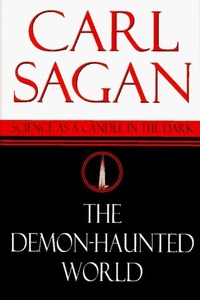Take a photo of a barcode or cover
informative
reflective
medium-paced
challenging
informative
inspiring
medium-paced
hopeful
informative
reflective
medium-paced
This a must read!! In the age of misinformation, echo-chambers, and AI, skepticism has become a lost art.
Sagan wrote this book over thirty years ago and aptly identifies anti-intellectualism as a dangerous trend in the United States that threatens our democracy and economy.
At first I was surprised by how much time the book spent debunking alien and UFO claims, but I later realized was a great way to set to the stage for deeper discussion on skepticism and pseudoscience.
Briefly, Sagan discusses how stereotyping scientists as crazed, awkward, or anti-social contributes to anti-intellectualism. This is something I’ve been thinking for years but wasn’t able to articulate.
This is an absolute must read for those who want to see a better, more truthful world.
I am thinking about using parts of this book as reading material for an introductory course into scientific research. I was surprised at how easy this work was to read given the strange combination of chapters all dealing with skepticism. Sagan has a few too many chapters focused on aliens and it got to the point where I almost stopped reading because he was beating on a dead horse, but eventually he moved on to other interesting topics. The last few chapters even delve into politics and it is almost as if he was specifically warning us about DT.
hopeful
slow-paced
I love Carl Sagan and his commitment to both the skepticism and wonder of science. In today's political climate of weaponized ignorance, I expected the Demon-Haunted World to be more relevant than ever and hoped re-reading it would yield helpful insights, but I'm afraid to say it is not up to the task.
The chapters on The Most Precious Thing, The Fine Art of Baloney Detection, and Science and Witchcraft are perhaps the most relevant today.
But the book elsewhere chooses targets that are less relevant (e.g., belief in God and alien abductions) or wholly out of step (e.g., downplaying the prevalence of child abuse). For these targets, his method of topic-specific refutation is of questionable persuasive value, even if people could be made to pay attention, and anyway the arguments he makes are not directly addressed to today's strains of pseudoscience (e.g., antivaxxers).
I was hoping for a study of why people believe nonsense and how they can be persuaded to change their minds, not a rational argument about why other people's views are nonsense.
Fundamentally, there are powerful interests who benefit from public ignorance and illiberalism. Sagan bumps up against several examples, but never asks why Rupert Murdoch would air footage of an alien autopsy, nor does he recommend how to counteract the deliberate misinformation of the tobacco and fossil fuel industries.
Thirty years after publication, the specific pseudoscientific beliefs have changed, but the perils for our society and government have grown.
informative
reflective
slow-paced
Really well written and readable. Disturbingly appropriate for today despite being 30 years old. Here's hoping we actually apply this wisdom in our world.
C - 10, A - 9, W - 9, P - 9, I - 7, L - 10, E - 8
C - 10, A - 9, W - 9, P - 9, I - 7, L - 10, E - 8
informative
inspiring
Glad I chose this for a re-read. It's interesting how much of what Sagan wrote is still relevant today and it sounds like he's writing about 2018 instead of the mid 1990s. The more things change, the more they stay the same.
hopeful
informative
inspiring
reflective
slow-paced
challenging
hopeful
informative
inspiring
reflective
medium-paced


